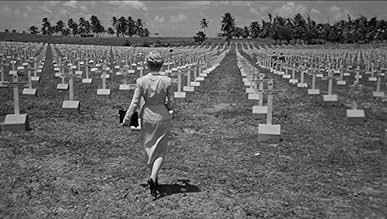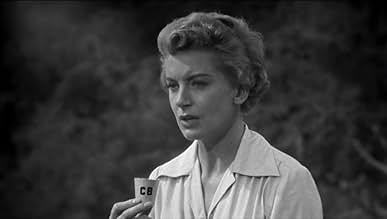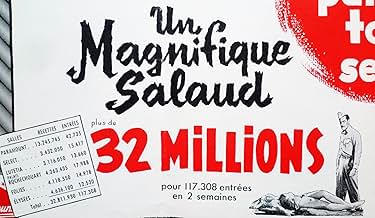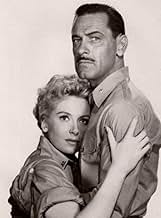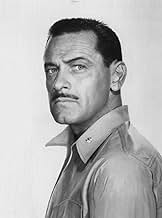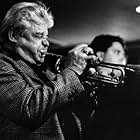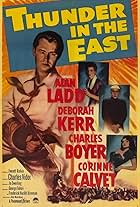In the Pacific during WWII, a Roman Catholic widow falls for a tough lieutenant colonel.In the Pacific during WWII, a Roman Catholic widow falls for a tough lieutenant colonel.In the Pacific during WWII, a Roman Catholic widow falls for a tough lieutenant colonel.
- Director
- Writers
- Stars
- Nominated for 2 Oscars
- 2 nominations total
Claude Akins
- Big Soldier
- (uncredited)
Nina Borget
- French Woman
- (uncredited)
George Brenlin
- Casualty
- (uncredited)
Lorayne Brox
- Sissie
- (uncredited)
Evelyn Cotton
- Beth
- (uncredited)
Maynard Ferguson
- Trumpet Player in Dance Scene
- (uncredited)
- Director
- Writers
- All cast & crew
- Production, box office & more at IMDbPro
Featured reviews
The combined credits of William Holden and Deborah Kerr will contain the titles of the best films of the Fifties. But The Proud And Profane will never go down in the top 10 list of either of these stars.
Kerr is a Red Cross volunteer sent to New Caledonia which was a major US base in the Pacific War in the Forties. She's a recent widow of a Marine Lieutenant killed at Guadalcanal. Now she's in her grief trying to make some kind of atonement. What we don't need here is women on some kind of pilgrimage as her new supervisor at the Red Cross played by Thelma Ritter points out. In fact Ritter tries many times during the film to give Kerr a reality check.
Holden was her husband's brigade commander and one tougher than usually tough Marine. Apparently her husband was a sensitive sort and Holden is unlike him in just about every way. In fact Holden is brutally frank about wanting to get to know her intimately and does.
After which he undergoes a complete change of heart. And it turns out he's married most unhappily to a woman back in the states.
These two stars had all the chemistry of vinegar and peppermint lifesavers. Funny because very soon Kerr was to be cast with Robert Mitchum in Heaven Knows Mr. Allison where he plays a tough Marine and she a nun. Those two were wonderful on screen together. But no movie magic emanated from the silver screen with Holden and Kerr.
William Redfield plays a chaplain and some of those scenes with Holden were like Spock and McCoy going back and forth. Redfield was way too self righteous in a way DeForest Kelley never was.
Best in the film is Thelma Ritter who many times is just that. And Adam Williams has a small, but key role as a gravedigger and tender in the new cemetery on Guadalcanal. He's the one who finally gives Kerr the ultimate of reality checks.
Definitely a film for fans of the two stars and Thelma Ritter.
Kerr is a Red Cross volunteer sent to New Caledonia which was a major US base in the Pacific War in the Forties. She's a recent widow of a Marine Lieutenant killed at Guadalcanal. Now she's in her grief trying to make some kind of atonement. What we don't need here is women on some kind of pilgrimage as her new supervisor at the Red Cross played by Thelma Ritter points out. In fact Ritter tries many times during the film to give Kerr a reality check.
Holden was her husband's brigade commander and one tougher than usually tough Marine. Apparently her husband was a sensitive sort and Holden is unlike him in just about every way. In fact Holden is brutally frank about wanting to get to know her intimately and does.
After which he undergoes a complete change of heart. And it turns out he's married most unhappily to a woman back in the states.
These two stars had all the chemistry of vinegar and peppermint lifesavers. Funny because very soon Kerr was to be cast with Robert Mitchum in Heaven Knows Mr. Allison where he plays a tough Marine and she a nun. Those two were wonderful on screen together. But no movie magic emanated from the silver screen with Holden and Kerr.
William Redfield plays a chaplain and some of those scenes with Holden were like Spock and McCoy going back and forth. Redfield was way too self righteous in a way DeForest Kelley never was.
Best in the film is Thelma Ritter who many times is just that. And Adam Williams has a small, but key role as a gravedigger and tender in the new cemetery on Guadalcanal. He's the one who finally gives Kerr the ultimate of reality checks.
Definitely a film for fans of the two stars and Thelma Ritter.
The Proud and Profane (1956)
Yes, this movie features William Holden and Deborah Kerr, who do their characteristic best in a lower budget echo of the 1953 blockbuster "From Here to Eternity," also featuring Kerr (but with Lancaster and, for good measure, Montgomery Clift). The comparison is fair, because the similarities are too blatant, and so it's fair to also say that, as ordinary as this movie is, it had potential. There are qualities to the story line that are too moving (wounded soldiers in the Pacific, a widow tracing the last days of her Marine husband's life, a love affair against the rules) and the actors are too fine (add Thelma Ritter as an important third) to just dismiss the whole thing as a mess.
The director, George Seaton, is really a screenwriter, and though he directed a dozen features, none of them are especially memorable. His real fame rests on assisting with several great movies (like "The Wizard of Oz") and with a single brilliant coup--the screenplay for the original 1947 as well as the later TV version of "Miracle on 34th St." And it is no surprise that Seaton's own screen writing in "The Proud and Profane," though prosaic, is very good.
Ah, but filmmaking is about timing, flow, surprise, drama, light, shadow, and sounds of all kinds. This is the director's blank canvas and Seaton doesn't go anywhere in any of these areas. The light is bright and flat. The camera-work is functional and bland (cameraman John Warren being a newcomer, moving quickly to television, including many Hitchcock episodes). The score is strong (thanks to veteran master Victor Young) but there is no attempt to insert diegetic music or more interesting internal sounds. Even the supporting cast is pigeonholed into clichés (and there is no critical secondary male role, as Clift played in the 1953 movie). Thelma Ritter is at her best, more normalized than in other roles, but believable and superb.
I write all this for a routine movie because of Holden, who is an understated and sometimes brilliant actor, and Kerr, who I never warm up to but who is almost designed to be too cold to like. Kerr in particular is up and down here, at times so perfectly cast and so convincing you start to really watch closely, but other times she has to stretch her role a little (when she is dancing, for example, or in the cheesy beach scene early on) and it's awkward. Holden is made to be an enigma, and when he warms up (out of uniform) he's likable, and when he's cold, he's cold, but never admirable, which is what a commander needs to be at least.
I enjoyed this movie because I enjoy movies, but also because it has aspects that are terrific. If you really like war films that aren't about battle (as I do), this is a must see. And if you want perspective on "From Here to Eternity" you really will appreciate both films more. For just a fresh, well-made movie, terrific you will need to keep looking.
Yes, this movie features William Holden and Deborah Kerr, who do their characteristic best in a lower budget echo of the 1953 blockbuster "From Here to Eternity," also featuring Kerr (but with Lancaster and, for good measure, Montgomery Clift). The comparison is fair, because the similarities are too blatant, and so it's fair to also say that, as ordinary as this movie is, it had potential. There are qualities to the story line that are too moving (wounded soldiers in the Pacific, a widow tracing the last days of her Marine husband's life, a love affair against the rules) and the actors are too fine (add Thelma Ritter as an important third) to just dismiss the whole thing as a mess.
The director, George Seaton, is really a screenwriter, and though he directed a dozen features, none of them are especially memorable. His real fame rests on assisting with several great movies (like "The Wizard of Oz") and with a single brilliant coup--the screenplay for the original 1947 as well as the later TV version of "Miracle on 34th St." And it is no surprise that Seaton's own screen writing in "The Proud and Profane," though prosaic, is very good.
Ah, but filmmaking is about timing, flow, surprise, drama, light, shadow, and sounds of all kinds. This is the director's blank canvas and Seaton doesn't go anywhere in any of these areas. The light is bright and flat. The camera-work is functional and bland (cameraman John Warren being a newcomer, moving quickly to television, including many Hitchcock episodes). The score is strong (thanks to veteran master Victor Young) but there is no attempt to insert diegetic music or more interesting internal sounds. Even the supporting cast is pigeonholed into clichés (and there is no critical secondary male role, as Clift played in the 1953 movie). Thelma Ritter is at her best, more normalized than in other roles, but believable and superb.
I write all this for a routine movie because of Holden, who is an understated and sometimes brilliant actor, and Kerr, who I never warm up to but who is almost designed to be too cold to like. Kerr in particular is up and down here, at times so perfectly cast and so convincing you start to really watch closely, but other times she has to stretch her role a little (when she is dancing, for example, or in the cheesy beach scene early on) and it's awkward. Holden is made to be an enigma, and when he warms up (out of uniform) he's likable, and when he's cold, he's cold, but never admirable, which is what a commander needs to be at least.
I enjoyed this movie because I enjoy movies, but also because it has aspects that are terrific. If you really like war films that aren't about battle (as I do), this is a must see. And if you want perspective on "From Here to Eternity" you really will appreciate both films more. For just a fresh, well-made movie, terrific you will need to keep looking.
Considering the cast this oddly obscure WWII war drama is nothing special but is ultimately an entertaining drama.
The basic story is a standard one of a clash of values between two people with very different life experiences.
The best performance as usual comes from Thelma Ritter as a no nonsense nurse, whenever she's on screen she cuts right through the somewhat sugary dramatics with astringent fortitude.
Deborah Kerr and William Holden perform their assigned roles well but their characters are both pretty selfish and unsympathetic to involve you in their story.
The basic story is a standard one of a clash of values between two people with very different life experiences.
The best performance as usual comes from Thelma Ritter as a no nonsense nurse, whenever she's on screen she cuts right through the somewhat sugary dramatics with astringent fortitude.
Deborah Kerr and William Holden perform their assigned roles well but their characters are both pretty selfish and unsympathetic to involve you in their story.
During WWII, a Red Cross volunteer comes to the South Pacific seeking information about the death of her soldier husband. Kerr is fine as the lonely woman struggling to cope with her loss. This is a strange role for Holden, who usually played characters with integrity. Although the actor is always worth watching, here his character is basically a dishonest heel. It's hard to believe that someone like Kerr, no matter how vulnerable, falls in love with him. Not surprisingly, Ritter steals the film as a tough but caring nurse. The screenplay and direction by Seaton, who worked with Holden on four films, is nothing special, but it's not bad either. The scenery is nice.
An intriguing recounting of the tolls of war from a human standpoint without graphic depiction of battle scenes, this focuses upon the lives of four primary characters stationed in Guadalcanal and/or Bataan, in the South Pacific, during World War II.
"The Proud and Profane" (Paramount, 1956) studies psychological aspects of its characters: Lieutenant Colonal Colin Black (William Holden in a belligerent role), Lee Ashley (Deborah Kerr as a determined force), Kate Connors (Thelma Ritter as a no-nonsense nursing supervisor), Eddie Wodcik (Dewey Martin as an innocent serviceman) and Chaplain Holmes (William Redfield as an altruistic minister).
While Lee volunteers with Kate's Red Cross troop with an ulterior motive in mind, Colin finds himself drawn to her unattainable reserve. Kate provides common sense for Lee to abide by and also security for the nurses and wounded service personal in her charge, as well as for Eddie, whom she treats as her nephew.
Produced by William Perlberg, directed by George Seaton, with its screenplay by George Seaton, based on a novel by Lucy Herndon Crockett, this wartime drama pleasantly buffers the viewer from unwelcome scenes of direct enemy attacks. Filmed in Black & White on location in Puerto Rico, this affords the viewer arrays of tropical scenery and often contains aerial footage of panoramic mountain scenery, as well as its calm coastal plains and lagoons.
Its capable cast handles its material well, with poignant portrayals of those who serve and suffer...in more ways than one.
"The Proud and Profane" (Paramount, 1956) studies psychological aspects of its characters: Lieutenant Colonal Colin Black (William Holden in a belligerent role), Lee Ashley (Deborah Kerr as a determined force), Kate Connors (Thelma Ritter as a no-nonsense nursing supervisor), Eddie Wodcik (Dewey Martin as an innocent serviceman) and Chaplain Holmes (William Redfield as an altruistic minister).
While Lee volunteers with Kate's Red Cross troop with an ulterior motive in mind, Colin finds himself drawn to her unattainable reserve. Kate provides common sense for Lee to abide by and also security for the nurses and wounded service personal in her charge, as well as for Eddie, whom she treats as her nephew.
Produced by William Perlberg, directed by George Seaton, with its screenplay by George Seaton, based on a novel by Lucy Herndon Crockett, this wartime drama pleasantly buffers the viewer from unwelcome scenes of direct enemy attacks. Filmed in Black & White on location in Puerto Rico, this affords the viewer arrays of tropical scenery and often contains aerial footage of panoramic mountain scenery, as well as its calm coastal plains and lagoons.
Its capable cast handles its material well, with poignant portrayals of those who serve and suffer...in more ways than one.
Storyline
Did you know
- TriviaFeature-film debut of Frank Gorshin playing the uncredited role of "Harry." In the film's opening at dockside, just after Lee arrives, Kate stops to talk to Harry about obtaining a can of paint off his truck.
- GoofsThe US Army Air Force C-47 cargo planes are painted in post WWII paint scheme rather than the wartime green. When the Air Force became a separate service in 1947 the white over bare metal paint scheme as seen in the movie was adopted.
- Quotes
Chaplain Lt. (jg) Holmes: It must be wonderful to feel that one has lived such a perfect life... that forgiveness has never been necessary.
- How long is The Proud and Profane?Powered by Alexa
Details
Box office
- Gross US & Canada
- $3,900,000
- Runtime1 hour 51 minutes
- Color
- Aspect ratio
- 1.85 : 1
Contribute to this page
Suggest an edit or add missing content



